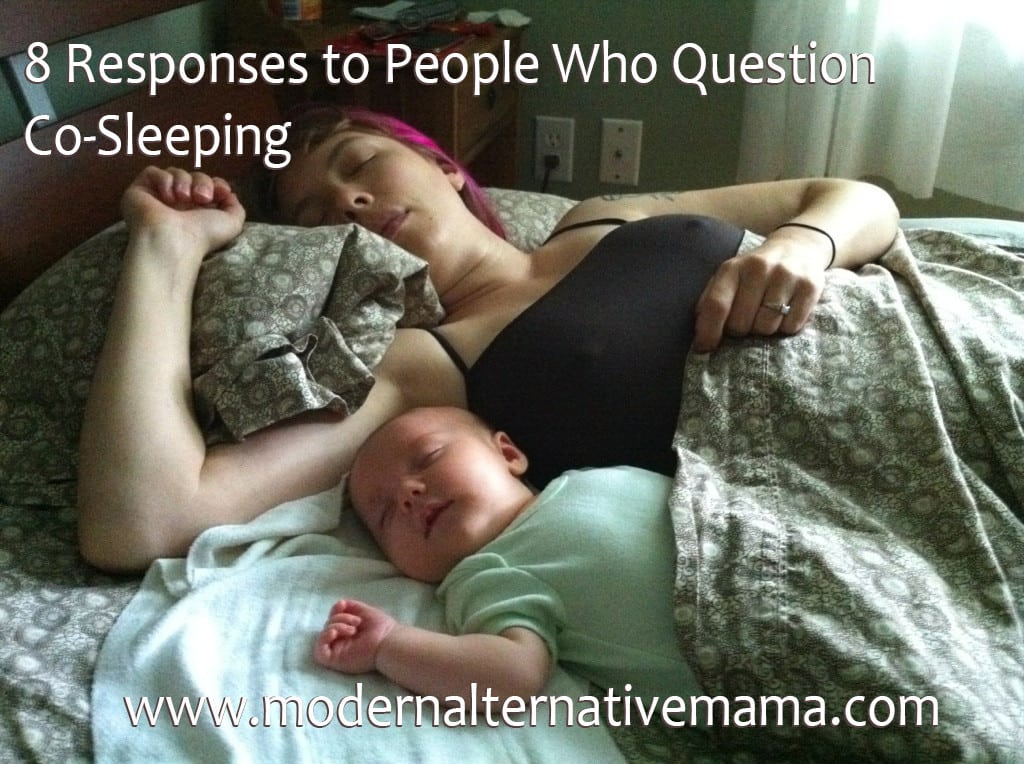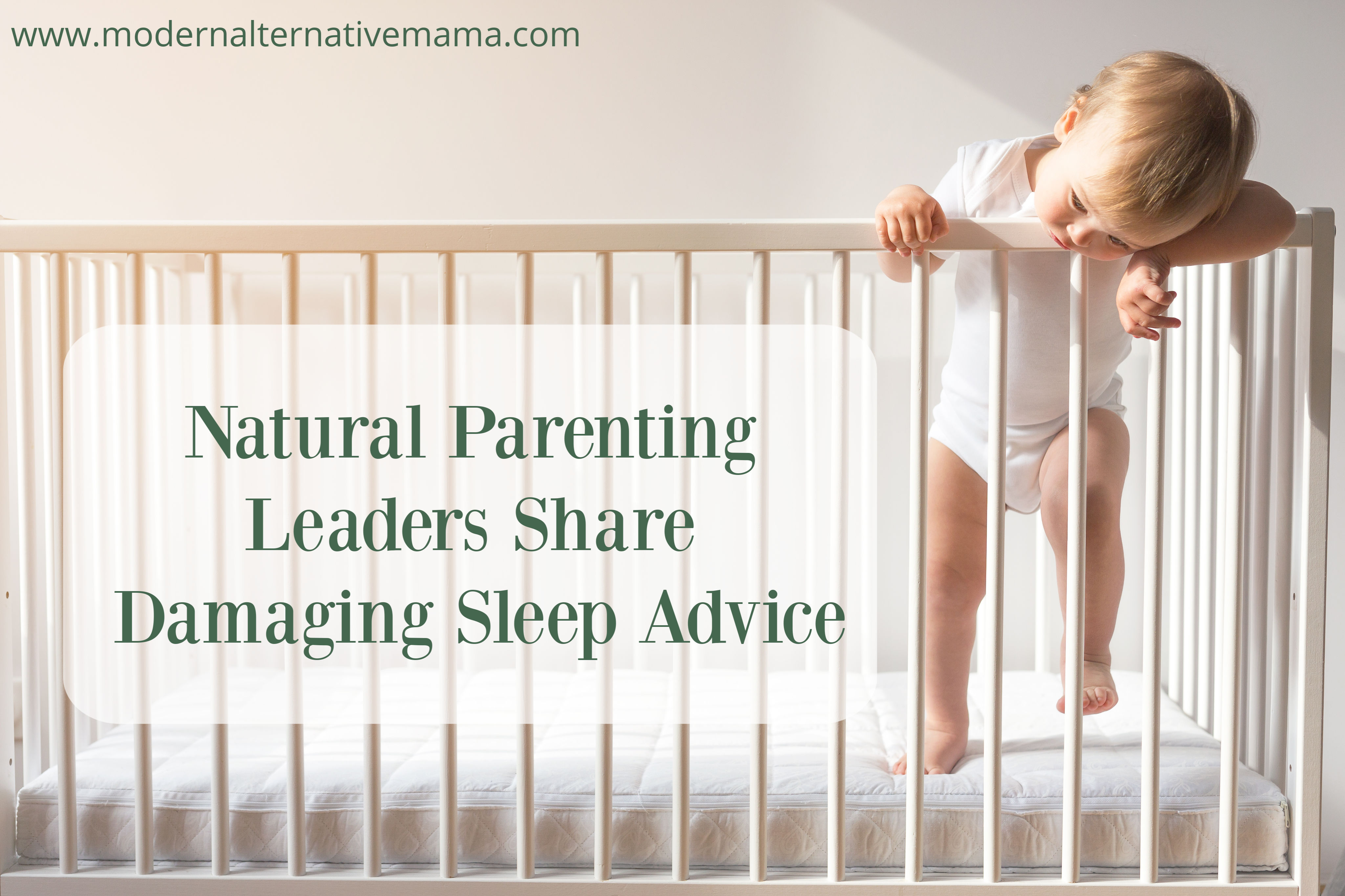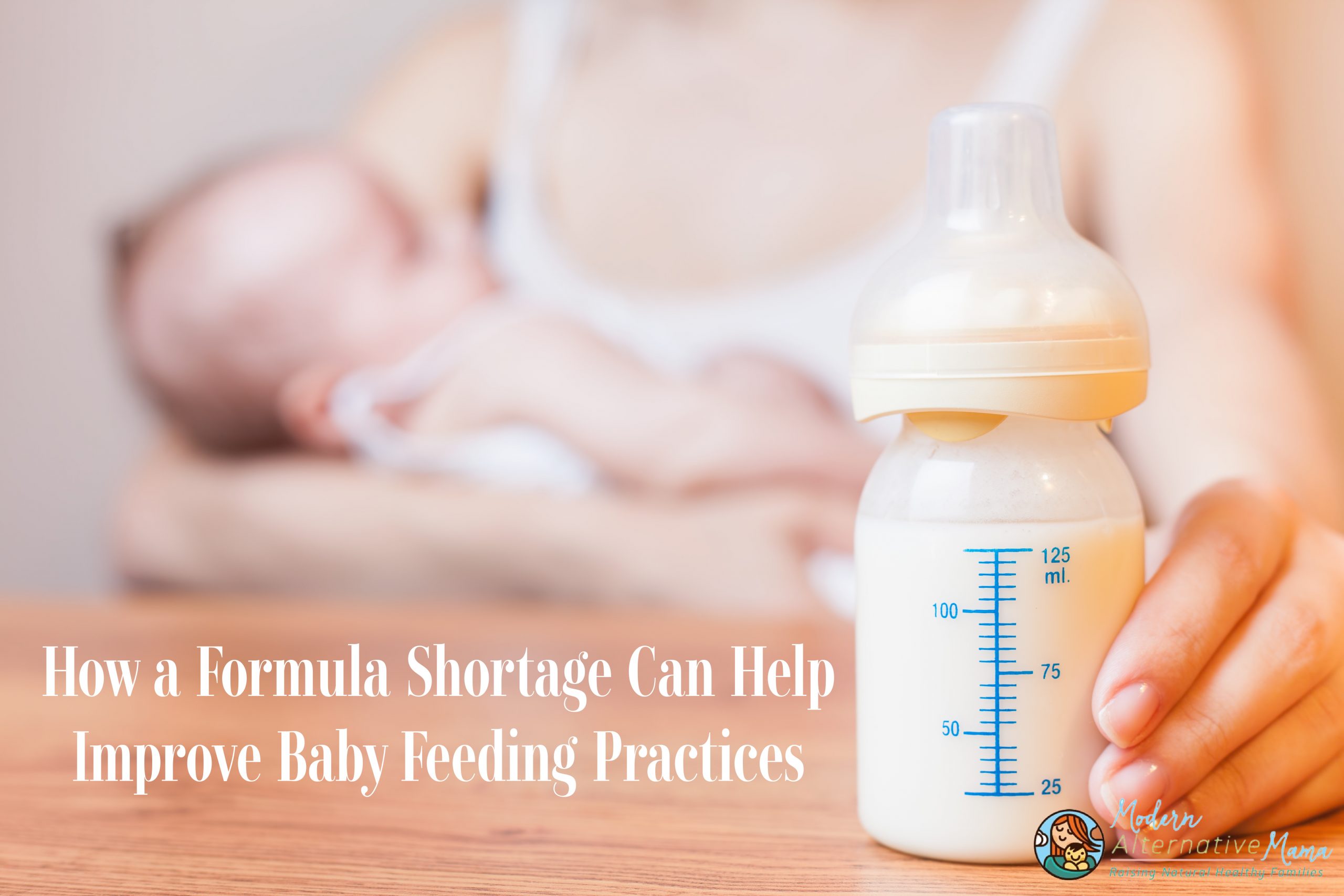Do you question co-sleeping? These eight responses to co-sleeping will help you better understand the benefits of co-sleeping and how to do so safely.
By Kristen, Contributing Writer
It felt like a thunderbolt had cracked beside my head. My eyes snapped open, all senses instantly on alert. It took only nanoseconds for me to realize my beautiful newborn wasn’t breathing. Within another few seconds, I had him positioned so the mucus and fluids lodged in this throat were flowing out, and I used a bulb syringe to assist in clearing his cheeks. He breathed – and so did I.
I still sometimes wonder what would have happened if my baby hadn’t been right beside me. Would my body have instantly picked up on the fact that my child stopped breathing? Would I have gotten to him in time if he’d been across the room? Would he be dead if he’d been in another room?
It may sound dramatic, but people who argue against co-sleeping are often equally dramatic, which public education campaigns (literally) painting pictures of babies in bed with knives and other dangerous implements as they try to illustrate the dangers of co-sleeping. Let me share 8 common arguments against co-sleeping, and responses to each for you to consider.
8 Responses to People Who Question Co-Sleeping
1. Co-Sleeping is Dangerous
The modern concept of babies being sent to their own rooms in isolated boxes is a very new trend for humanity. Almost every traditional culture shared sleep with their babies for a reason – baby can be monitored, mom helps baby maintain body heat, breathing patterns (respiration), and even blood sugar levels are balanced.
The reality is, sleeping alone is pretty dangerous for a baby. Newborns especially have immature nervous systems. Periodic apnea (not breathing) is common with babies. Researchers believe that being near Mama can help a newborn “remember” to breath.
It is true that co-sleeping can be unsafe, and it’s these unsafe sleeping conditions that cause many of the deaths attributed to co-sleeping. In fact, almost all reported “co-sleeping” deaths have other, prominent risk factors (in fact, on average, 4 risk factors are present in every reported death) [1].
As long as it’s done safely, and it can be done safely, researchers such as Dr. James McKenna [2] have found that co-sleeping and room-sharing increase sleep safety for babies.
How can you make sure you’re co-sleeping safely?
- Do not smoke (this guideline is important in pregnancy, too)
- Breastfeed your baby – research has shown that bottle-feeding families do not have the same protective sleep instincts and do not position the baby in the same protective ways as breastfeeding families [3]
- Sleep on a firm mattress
- Consider having a co-sleeper, like the Arm’s Reach, so baby has his/her own sleeping space
- Never put your baby on a pillow
- Don’t share sleep after parents have taken sedatives, have become intoxicated with alcohol, or taken other drugs/medications that impair judgment and alertness.
- Parents with long hair should tie it back
- Extremely obese parents should have baby in a co-sleeper or bassinet nearby
- Don’t leave baby in an adult bed alone
2. The Baby Will Never Go to Sleep Alone
As I noted above, co-sleeping is the biological norm for human families – and we do not have groups of people who must all be piled in bed in order to sleep.
Kids learn to sleep on their own. It may take a little more time to help a toddler discover how to sleep well on his or her own if your family has co-slept from the beginning, or it may not.
For every family that has a dramatic story about how hard it has been to move a child to his/her own bed, there are many others who don’t mention it because it wasn’t a big deal.
You’ve probably also heard plenty of stories from families who had baby in a crib from the beginning and still have plenty of trouble with getting their child to “sleep through the night.”
We have 7 kids. Our 7th is 12 months old and still in bed with us, but the other 6 sleep just fine in their own beds. The transition was not hard for us. We’ve always moved toddlers to their own bed and we don’t have nightly pilgrimages of children coming to our room.
I think moving a child to their own bed and their own room depends a lot on the child’s personality. And I think parents can make it pretty matter-of-fact and stress-free, especially when a child knows his or her needs are met day and night.
Want tips on getting your little one to sleep? Check out my Ultimate Baby Sleep “Crib Sheet” (no crib required!) for proven tips and better sleep for the whole family!
3. I Won’t Get Any Sleep
Many moms and dads assume that having a baby in bed will mean less sleep, but the opposite is actually true for most families. The baby is safe and secure and sleeps well in bed next to Mom.
Newborns need to eat at night. Almost everybody accepts that, and it’s a medically documented fact. Your baby’s stomach is tiny and s/he is used to continuous nutrition. The switch to having meals only at certain times is quite the transition! Your baby needs to eat at night. Respected sleep researchers have found that babies often need to eat at night up to 9 months (very different from the 6 week point stated by many “sleep training” resources) – and that it’s just fine for babies to nurse at night after this if the mama and baby are both happy [4].
If baby isn’t in your bed (or even in your room), you need to get up out of bed each time your little one wants to nurse. A rocking chair or another kind of chair is cozy during the day, but at night you probably really want to be in your bed! You can nurse your baby lying down and both of you drift off to sleep together.
Sleep researchers have found that breastfeeding moms instinctively position their babies in safe ways at night, and often curl protectively around their babies, creating more safety (this isn’t seen with bottle-feeding moms).
The mother-baby dyad is able to sleep peacefully at night, with the mother hardly having to wake to help latch baby on. There are far, far fewer interruptions – no having to get up out of bed, get the baby, position baby with a nursing pillow, wait through the feeding, get baby settled, and finally go back to bed (multiple times a night).
Co-sleeping mamas get more sleep!
4. We Won’t Be Able to Make Love
I will admit that having a baby in the bed can put a damper on intimacy. Generally, however, you’re not really feeling up to having a romp in the sheets with a newborn. Once your baby is a little older, there are other options:
- Have baby on one side of the bed and you as a couple enjoy each other on the other
- Put baby down to sleep in a bassinet or crib for a little while
- Get baby settled and then find an adventurous spot to have a little fun
I actually find this concern to be pretty common, which is really interesting given the number of co-sleeping families who are expecting baby #2, #3, #4… or more! Obviously, these families have found some time to make another baby!
Remember, lovemaking doesn’t have to happen in bed, and your baby doesn’t always have to sleep in your bed. Co-sleeping isn’t an all-or-nothing thing, and it’s likely your baby will sleep other places for naps, or could start the night out in his or her own bed. You’ll be able to find time for intimacy.
5. Co-Sleeping May Encourage Abuse
Sometimes health officials state an increased chance of abuse as a reason not to co-sleep. Studies have actually shown that adults sharing sleep with their children tend to form strong, protective bonds. Those children are less prone to abuse.
Children isolated in their own rooms, away from other adults are actually more likely to be taken advantage of by sexual predators because the isolation helps to hide what’s happening from other adults in the home. A healthy family with no other risk factors does not increase abuse (or temptation) by sharing sleep.
Again, families form strong, more protective bonds when sharing sleep.
6. Co-Sleeping Babies Will Never Learn to be Independent
It is true that your baby needs healthy sleep habits. And it’s also true that you can build those healthy sleep habits while breastfeeding your baby – and while co-sleeping.
What researchers have found is that babies tend to need consistency in one of two ways:
- That you consistently comfort your baby and go through a sleep routine that leaves them drowsy but not sleeping when you put them down OR
- That you consistently comfort your baby and go through a sleep routine, then stay with them until they’re in a deep sleep
Being inconsistent with how you put your baby to bed can cause confusion for your baby, which can make establishing good sleep habits tougher. It’s still not impossible, however, and you can help your baby learn to sleep well. If you start off with the “stay with them ‘til deep sleep” method, you can gently transition to the other method.
Again, I have 7 kids. I’ve found that it generally takes about 2 weeks to work through a sleep transition with a child (from family bed to their own bed, from our room to their room, etc.) – then things are just fine and I have good sleepers. Transitions are a normal part of life for everyone, and part of parenting is helping your child through various transitions.
Babyhood is only a short time, and you will help your child develop healthy sleeping habits – consistency, not sleeping location, is key.
7. Babies Need Long, Uninterrupted Periods of Sleep
It’s actually far safer for babies to be light sleepers. Again, research and sleep studies have shown that young babies have a “light sleep” pattern. There are periods of “normal” apnea (not breathing), and if a baby is deeply asleep, s/he may not be able to awaken enough to start breathing again.
Babies tend to sleep more lightly with an adult present, and they mimic the sleeping and breathing patterns of their mother. Moms and babies essentially get “in sync” with each other so baby stays safer.
These light sleeping patterns are natural and normal for babies and moms. As children get older they move toward more adult sleeping patterns over time – by four months babies tend to have more adult sleeping patterns, though many babies need to wake to nurse. By nine months most babies are able to drop night nursing, but again, research has shown that babies and families are still well-rested if nighttime nursing continues at this point.
A much more likely culprit for overtiredness in babies and young children is lack of daytime sleep. Working to find a good pattern of morning and afternoon naps can go a long way towards enhancing nighttime sleep.
8. My Baby Will Have An Unhealthy Connection Between Snacking or Eating and Sleep
It is true that many adults want a bedtime snack and some adults get up for a midnight snack – but that has no connection with a young baby nursing at night.
As I’ve noted, newborns have tiny stomachs and a physiological need to eat at night. Older babies, too, often truly need to nurse at night. Once a baby reaches 9 months, most researchers agree there is no “need” to nurse at night, but also no harm in it.
Your baby nurses at night for comfort more than anything else – it’s a close emotional bond with you. We’ve already seen that families that share sleep form close, secure bonds, and that children can confidently transition out of the family bed.
Nursing has a close association with Mama – not with other forms of food. Some families do start the habit of a before-bed snack or even a middle-of-the-night snack, but that’s a choice that any family may make. We’ve always preferred to have nighttime “snacks” stop when the child is weaned, and that has worked well for our family – no more snacks. Our children are healthy and at great weights.
Breastfeeding and midnight snacks are two very different things, and one does not lead to the other 😉
Hopefully, you’ve gotten a better picture of the realities of co-sleeping, and feel confident that it can be a safe, healthy choice for your family. I’m forever grateful that I was with Corwin the night he stopped breathing right beside me – right there where my instincts could kick in and save his life. There is no greater answer for the natural design and rightness of a mama and baby snoozing together.
Have You Gotten Any Negative Feedback About Co-sleeping? What Has Your Response Been?
- http://www.huffingtonpost.com/american-anthropological-association/co-sleeping_b_1533338.html (Accessed 2/17/16) ↩
- http://cosleeping.nd.edu/mckenna-biography/ (Accessed 2/17/16) ↩
- http://cosleeping.nd.edu/frequently-asked-questions/ – see #7 (Accessed 2/17/16) ↩
- Healthy Sleep Habits, Happy Child by Dr. Marc Weissbluth ↩
SaveSave








“Breastfeed your baby – research has shown that bottle-feeding families do not have the same protective instincts”
That’s bullshit. I’d like to see what study they’re referencing with that.
I know right? That’s a slap in the face. The “studies” we’re probably done by breastfeeding families only. I had to bottlefeed because I didn’t make enough of my own milk but my motherly instincts in no way diminished while co-sleeping with my baby. It’s there. I stopped reading the article when I saw that fucking comment.
http://m.huffpost.com/us/entry/bed-sharing-risks_n_5578744.html
Well done! Pinning this!
Nice article but I take serious offense to the repeated claims that bottle feeding families don’t position their babies in protective ways when co-sleeping. Our daughter bottle fed and co-slept with us her first year and we were always very careful to ensure she had enough room and was positioned safely and comfortably. Implying that feeding your child with a bottle instead of a breast makes you less of a caring or protective parent is the kind of divisive, disgusting rhetoric that makes formulas moms feel ostracised to this day.
[…] putting away! (I’m not the only one, right?) Where do my babies sleep? With me, of course. Co-sleeping/bed sharing is biologically normal and socially normal in most cultures around the world. Co-sleeping reduces […]
Actually, the research is accurate. It is not that bottle fed moms are not protective, because some can be…but there is research that shows a difference in where the baby is placed to feed with bottle VS breast. There are also other studies showing differences in breast vs formula babies, such as breastfed babies sync their breathing and wake cycles with mom, the same was not noted for formula only babies. The babies that were on formula, even in the same room did not have the same breathing cycles that breastfed/close to mom babies did so mom did not wake when baby stopped breathing and baby did not take a breath when mom did. So that research has shown that breastfeeding and co-sleeping helps catch baby apnea whereas it did not happen with formula babies.
http://cosleeping.nd.edu/frequently-asked-questions/#Q7
She is not trying to say bottle moms are bad, she is giving light to the nay-sayers that put their infant in a totally different room from birth, which has shown to increase SIDS and yet is still done and recommended over co-sleeping.
Thank you for clarifying this. People need to understand that parenting naturally, as we are biologically meant to (from feeding to sleeping and so on) will always, always provide a more natural instinct between baby and mother. A breast feeding mom cannot explain the feeling of connection and bottle feeding mom’s cannot begin to understand the difference!
I have done both bottle feed and breastfeed. I wasn’t able to breastfeed my last baby but my bond was No different. Nor were my co sleeping habits. This theory that bottle feeding moms don’t ‘get it’ isn’t true. I did both and my perspective is my connection was the same and my bond was as well with all my children. The way I slept with my babies was no different either. I wanted to like this article so much but there were some remarks that really read bad. And offensive to bottle feeders. Not all mom’s have a choice and articles comparing “bonds” is very ignorant to me. Not sure where the facts about these studies are but I am finding it hard to believe there was a study about the position moms put babies in when the breastfeed vs bottle feed. Silly comparison really.